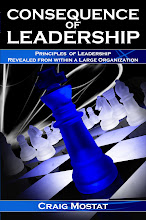Of course ... umm ... yes ... the customer is the most important. So, let's do something to show that we really do believe this. Let's ... umm ... oh I know, create a survey that the customer can take. We can offer it to them to fill out afterwards to rate us on our service. Wow, we could even tie performance bonuses to the outcomes of these surveys ... what a great idea.
Then a lengthy survey is developed with questions around the decisions, strategies and tactics that the organization has already determined the customer wants. There is almost never an opportunity for the customer to provide opinions on what the organization could to more effectively satisfy their needs outside of those strategies and tactics, and if there is, in my experience the decision makers never see the comments. Since these surveys are filled out after the customer experience, they often have little impact on that customer's potential return, and if your business only serves a customer once a year, or once in a lifetime, this is less than ideal. Certainly, you could make changes for the future, that is, if you actually had a survey that could capture useful data and reacted to it. But people talk and market your business for you – hopefully in a positive way – but sometimes negatively.
Most organizations offer "The Customer Survey" as a necessary evil - kind of like a fuel station offering public washrooms – an inconvenience, often messy, but a necessary part of the business.
the business.
"Multiple choice," "on a scale of..." and "yes or no" kinds of questions cannot capture customer opinions in a way that will help you to effectively adjust your business. More often than not, these surveys end up becoming just another metric that is used to internally evaluate. Has your enterprise ever made a decision to change strategy or tactics based on the answers to the questions on these surveys? One only has to view the questions to see that it is impossible to get any information that is useful for changing or developing strategy.
Why not ask your employees. Throw out the "we feel customer opinions are important" hypocritical surveys, and start asking the people that work for you, have allegiance to and are interested in helping the business that they work for. Why not ask those who are in many companies – your best customers – and those who deal with and talk to every customer that provides revenue to your organization. They hear and experience the feedback every day, and if you are truly interested will tell you about it. Since they are in a unique position, closer to the customer than anyone else in the organization, sometimes they even come up with some profound ideas – ones that if heard and implemented could propel your business into the stratosphere.
One effective method to capture the ideas of employees is an "Employee suggestion system", which I will explore in my next post. What stories of famous employee suggestions which have significantly increased a company's results have you heard about?
Related Posts:




Craig
ReplyDeleteThis is absolutely right on. I couldn't help chuckling thinking back to the time when airlines served meals. On one flight I received a lengthy customer survey asking me my opinion of the food I received on the plane -- but only as a five point scale asking me whether I thought the food was about the same as, worse than, better than, much worse than, or much better than competitors' meals. There were about ten competitors listed and three meals, so that was about thirty ratings with little circles to fill in with a No.2 pencil. No space for comments. I decided not to take the survey. I just wrote across the bottom something like, "Why aren't you asking me for my opinion of whether the food is good or not? In coach, all airline food sucks!" and handed it back to the flight attendant. Probably didn't conform to their preconceived notions of what the survey should do for them. And most most domestic airlines have gotten rid of serving meals anyway, so it's certainly a moot point now!
And I couldn't agree more with the need to talk directly with the people who are serving the customers. Some years ago I worked with a manufacturer with a customer service center located in another state. Occasionally a VP from the home office would fly out there, or the manager of the place would fly to the home office, but the center was about as isolated from the company as it could possibly be. The opinions of the people on the phones? Not a chance. The managers were too busy figuring out how to deal with employee morale issues and how to set effective quotas for calls "processed."
Great post, as usual!
Hi Dan and thanks for your comments.
ReplyDeleteYour airline experience is a great example and their survey is essentially the same as all of these surveys – not designed to capture any real and useful information. The information gathered obviously didn't do anything to help the food. Interestingly, the airline that you cite wants to compare the food to the other airlines. In essence, “how can we be the best in the category of mediocre airplane food?” Wouldn’t want to set their sights too high now would they.
I heard a talk by Andy Stanley this week in which he said, “Just because you are the leader, doesn’t mean that you are the smartest person in the organization.” How true, and just the acknowledgment of this fact by many leaders would tip the scales in the area of listening to team.
Thanks again for you comment Dan – I appreciate it.
Craig